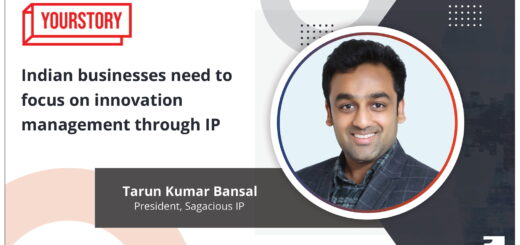Financial Express – Budget 2020: Focus on tech is going to propel ‘Make in India’ vision further
Budget 2020 India: The thrust on quantum computing as a key focus promises to further consolidate India’s position in the global digital transformation landscape.
Budget 2020 India: The Union Budget 2020 came with some firsts for India’s new economy, Intellectual Property (IP), healthcare and infrastructure sectors. What was common to all these areas during the Budget presentation was the technological twist they came with. The announcements made by the FM in terms of creating and protecting IP has been lauded by India Inc. The proposed digital platform for capture of Intellectual Property Rights (IPR) and an Institute of Excellence to work ‘on the complexity and innovation in the field of IP’ have been a hit with the people working in tech, product and associated legal industries.
Tarun Kumar Bansal, president, Sagacious IP, a global IP firm, says, “It is heartening to see IP getting more and more focus from the government. This digital platform for easier submission of applications combined with technology transfer centres as well as prototyping/proof of concept facilities will definitely boost innovations and startups in India.” The platform may address some important challenges in securing an IP.
“In lack of tech transfer processes/ facilitator, entrepreneurs have no choice but to either pursue the idea on their own by getting investment, etc., or to drop it completely. With tech transfer being a focus, they shall be able to profit even by just selling/licensing their technology,” Bansal explains. “In all this, increased focus on IP will definitely benefit Indian economy and will boost entrepreneurship and ultimately help government meet its ambition of a $5-trillion economy.”
In addition to the digital platforms, the announcement of Knowledge Translation Clusters has gained attention from entrepreneurs and IP professionals. Swapna Sundar, CEO of IP DOME, and an IP strategist, says, “A much needed input to Translation Clusters would be the need to educate startups and MSMEs on business compliance and the risk of non-compliance. In R&D, the first steps into the market immediately throw up challenges such as regulatory compliance regarding materials, design and environmental clearance. Currently, many of our clients requiring good quality prototypes within a defined timeline prefer to get them done in China or Taiwan or another appropriate economy where industry is well-prepared to undertake novel projects. The Technology Clusters and test beds would be a useful and effective alternative.”
Modern technologies such as Artificial Intelligence (AI), Machine Learning (ML), Internet of Things (IoT), 3D printing and quantum computing were also in the limelight during finance minister Nirmala Sitharaman’s Budget speech. According to Siddharth Pai, founding partner, 3one4 Capital, ‘entrepreneurs’ who were once employed in highly skilled engineering jobs at IT services majors have the potential to put India on the global quantum computing map. Rightly so, the FM has announced Rs 8,000 crore for the National Mission on Quantum Technologies and Applications in this Budget, spread over five years. While this is a new announcement altogether, the government which has been emphasising on data since the last two Budgets, has yet again bolstered its vision for leveraging data with the announcement of a new policy to build data centre parks.
There will also be a great involvement of private players in accomplishing this feat. Sunil Gupta, managing partner and CEO, Yotta Infrastructure, the managed data centre service provider from the Hirnandani Group, says, “India continues to have an abnormally low data centre capacity which is inadequate to support data localisation and the digitisation growth we have witnessed in the recent past.” According to him, latest research indicates that India needs 15 times more data centre capacity to realise the true potential of Digital India and make the $5-trillion economy a reality. “I am looking forward to the announcement of the new policies and am confident that it will provide a much better environment in which the data centre sector will thrive,” he says.
Technology in this Budget has found its place in healthcare and in two national level science schemes to create genetic databases. “While it is early to say how it will be implemented, we should see mapping genomes without political and bureaucratic biases. India has a diverse genetic pool and tapping it will give India a unique position, similar to a nuclear superpower of the last century,” says Pai. The Finance Minister also insisted on having AI in healthcare—to try and use its predictive power to prevent diseases and epidemics. “I am especially encouraged by the efforts to use AI and ML to improve disease detection and pre-emption as part of the PM Jan Arogya Yojana. Such applications of emerging technologies combined with the focus on increasing the penetration of fibre connectivity in the nation have the potential to fundamentally impact the lives of millions in the coming years,” says Prakash Mallya, VP and MD—Sales and Marketing Group, Intel India. Further at the ground level, anganwadis are set to upload nutritional data for more than 10 crore households to enable child and mother care, thereby also putting technology and data at use in the caregiving sector.
Some of the other significant announcements involving technology includes the announcement of five new smart cities and allocation of Rs 6000 crore to connect 1,00,000 gram panchayats by fibre-to-home aimed at increasing educational and job opportunities. IoT is a key technology in enabling smart cities and as part it and of power and renewable energy related announcements, a smart metering scheme was also announced.
According to Varad Krishna, Board of Director-Strategy, WinAMR Systems, the usage of prepaid smart meters will boost the power sector besides ensuring additional benefits for all the stakeholders through modernisation of the power grid through smart grid technologies. “The discoms will gain immensely as it will bring more transparency for the entire value chain from power generation to consumption and especially prevent losses through power theft. The consumer has the option to shift from one utility to another. The Budget proposal for the power sector announced is a step towards de-regulation to bring additional players,” adds Krishna.
As part of the infrastructure projects, there will also be a scope for startups to add value using their tech in automating certain business processes involved in the projects. Semiconductor and mobile/ electronics manufacturing industries have also reason to rejoice as a new scheme to enable those businesses is set to be announced as mentioned in the Budget.
On the whole, technology underpins almost all aspects of Budget 2020, aiding its socio-economic cause.
Originally published on https://www.financialexpress.com/budget/budget-2020-focus-on-tech-is-going-to-propel-make-in-india-vision-further/1853235/




